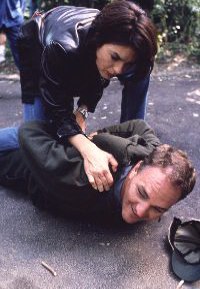
Law & Order SVU: Articles, 2000
Law & Order: Special Victims Unit
Steven Isaac, Plugged In, 7/2000
 Words. As powerful as what they represent. One of the most evocative and vicious words in the English language is rape. That termóand everything it embodiesóis a point of fixation for Law & Order: Special Victims Unit. Words. As powerful as what they represent. One of the most evocative and vicious words in the English language is rape. That termóand everything it embodiesóis a point of fixation for Law & Order: Special Victims Unit. Unquestionably, veteran producer Dick Wolf uses his series to convey the horror of sex crimes. There is also, however, no denying that television has a way of trivializing, distorting and desensitizing us to human tragedy. "My TV doesnít listen when I give it pieces of my mind/It keeps making everything the same size," wrote a contemporary songwriter, "pain is pleasure when itís televised."
Rape. Torture. Mutilation. Death. It is to these twisted crimes that the "elite" New York City police squad known as the Special Victims Unit dedicates itself. A lawyer is beaten, raped and murdered in Central Park. A Romanian girl is kidnapped, tortured and imprisoned in a small wooden box. Eight women are fondled and raped in front of other subway passengers. A stalker maces and rapes three women.
Have these pains become pleasures for American audiences?
Most of this heinous material is communicated verbally. The detectives, led by actors Christopher Meloni and Mariska Hargitay, discuss the excruciating details of each case. A few characters are given to "morgue humor," prompting jokes about such things as public flashing, masturbation and condoms. "B--ch" and other profanities are flung about by both the perpetrators and the protectors.
These words are at times accompanied by numbing images. The "subway rapist" is shown assaulting one of his victims (the terror in her eyes lingers). Open wounds from sadistic rituals leap from a set of Polaroid prints. The blood-soaked faces of murdered women scream for a rescuer who would never come.
To call Law & Order: SVU simply gut-wrenching would be inadequate. Why anyone would watch it each week merely as entertainment is inconceivable. It opens the door on a hideous underworld where no one is safe, not even those standing on the threshold peeking in for a few sordid details. When a police psychologist asks Detective Stabler (Meloni) if he talks about his work at home, he hastily replies, "I donít let that world touch my family." The counselor counters, "But that world is everywhere, you canít put them on 24-hour surveillance." "True," Stabler admits, "but it doesnít mean I have to be their window into it." Donít let NBCís SVU be your teenís window into it.
|